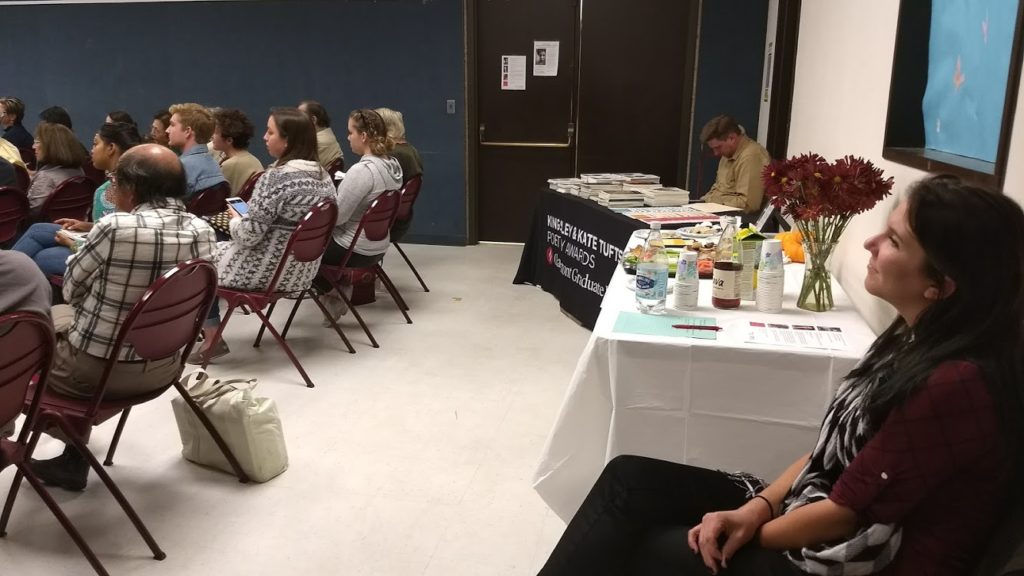The Electricity of Vievee Francis

It is probably not news for anyone reading this blog that T.S. Eliot begins the The Waste Land with the seminal line, “April is the cruellest month.” T.S. Eliot died in 1965, which is 31 years before President Bill Clinton issued the proclamation that April was also National Poetry Month. According to the Academy of American Poets, poets, booksellers, librarians, and other various literati chose the month of April because it “seemed the best time within the year to turn attention toward the art of poetry—in an ultimate effort to encourage poetry readership year-round.”
I choose to believe that it is in homage to Eliot.
For one of these reasons or another, April, for the Kingsley and Kate Tufts Poetry Awards, also means the awards ceremony for both prizes. It is a brief whirlwind of excitement for us here at CGU as we greet our poets, whisk them to the ceremony, and send them on their merry way (with a hefty check).
October, however, is the coolest month for poetry at CGU, because we invite our Kingsley Tufts Award winner back for a week-in-residence. This year, we had the pleasure of hosting Vievee Francis.
The week-in-residence is chock-full of events. Vievee gave five poetry readings, visited three classes, held a poetry workshop for CGU students, and was wined and dined every day. That being said, it is a week that seems both to last forever and to be over far too soon.
Critics have called her work “a sacred conversation with the reader, wresting with the distressing angel for all of us” (Patrick Donnelly), “brave, prickly, luscious, erotic” (A. Van Jordan), and “fraught with images of confinement and degradation” (Connotation Press).
What I learned about Vievee’s poetry during her week in residence was that she revises her poems 30–40 times before they are done. That she writes in the morning.
What I learned about listening to Vievee’s poetry is that when she reads to a crowd, I am not the only one who has a visceral, jarring, physical reaction to her words. Her poem “Taking It” made me feel like I, not the figure in the poem, had been “hit [in] the line below the belly.” The line, “I made love like a sea creature,” from the same poem, inspired troubling dreams.
But what I learned about Vievee herself is that she is anything but prickly or fraught, and in her presence you feel as if you are engulfed in a great hug, not punched in the gut. After a poetry reading at the Claremont Mt. San Antonio Gardens, we serendipitously met Myrlie Louise Evers–Williams, a civil rights activist who spent most of her adult life seeking justice not only for her husband, who was murdered by a Klansman, but for the entire black community. Vievee wept openly. Awards Director Lori Anne Ferrell said to me, “Vievee has an alchemy about her, she is unguarded, and there’s a comfort being in the presence of wisdom and clarity. She has a presence with a capital P.”
She is rambunctious, quick-witted, and laughs easily. “I hope you don’t mind that I have a silly side,” she told me during one of our many car rides. “Brooding poets are the worst,” I responded. And we laughed about that.
She takes her burgers with pickles and her fries extra crispy. When I asked her if she wanted an In-n-Out hat, she responded: “A hat! They have hats? Of course I want a hat!”
“Two?” I asked.
The reply was an emphatic yes and we departed burgers in hand and donning new headwear.
There’s a running joke in the English department about how I fall in love with all of the poets that come to CGU. It’s at least a little bit true, and Vievee is no exception. But as the topic came up, her capital P presence resurfaced. She told me not to love too easily. That I need to love poets on their own terms. She warned me to protect my heart.
On our last night together, Tufts Poetry Awards coordinator Genevieve Kaplan (who is also an astonishing poet), Vievee, and I went to Union on Yale for a farewell dinner. Over a whiskey cocktail called the Remedy (bourbon, lemon, brown sugar, sage, and ginger) we discussed our various relationships with writing, her husband (who calls her bunny), and took selfies wrapped in blankets.
We ate an entire fried chicken, and that fowl did not die in vain.
—Emily Schuck
Share